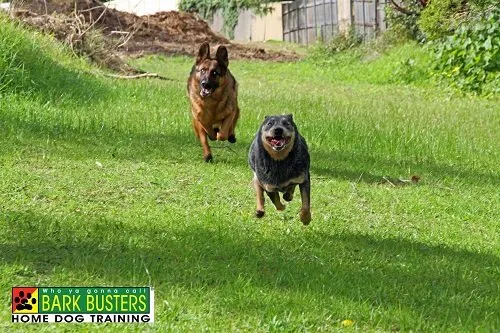Does Your Dog Come When Called?

If your dog comes every time you call theem, that's great. But if you find that your dog consistently ignores your recall, then you may need to improve your technique, and put some training into place for your dog.
Firstly, you need to set yourself up for success. You need to retain some control over the situation whilst you are training your dog to come to you consistently. We recommend a 10 metre soft cotton webbing lead as the best place to start as you can then allow your dog some extra freedom whilst retaining the ability to show and guide them as to what you want them to do. We don't recommend a retractable lead when walking or teaching recall. A fixed lead is far safer for you and your dog.
You must also ensure that your voice tones are working for you. If you shout at your dog in an angry voice, they are possibly going to think twice before coming to you. You need to call them in happy, light tones that encourage them to want to come back to you. Use lots of praise when your dog comes to you. As Bark Busters' trainers we often find that a common reason for problems with recall is that owners only recall their dog when there is either a problem, or when it's time to go home. This doesn't encourage your dog to want to come back to you. It is far better, when training recall, to keep recalling your dog, lavishly praising them and then releasing them again. Doing this several times when you are out trains your dog to understand what you want from them, shows them that there is a reward for this behaviour, and also shows them that your recall doesn't mean that their fun is over. Doing this also has the effect of making you more interactive, and more interesting to your dog, and will help them to keep focused on your whereabouts.
When you praise your dog for coming back to you, the praise must come as soon as they start to move towards you. Whilst they are learning recall, praise them immediately when they start to make their way back to you so they understand why they are being praised. If you put in a 'sit' command, and ask them for their paw before praising them for returning to you, they will think they're being praised for giving you their paw, and not for the great recall.
Once you have consistent recall on a long lead (without you having to reel them in), you can progress to recall off lead, but be sure to start in an enclosed area like your backyard or a tennis court. Once recall off lead is consistent in the enclosed area, you can progress to open areas.
When exercising your dog off lead, be mindful that there will be dogs who are on lead for a reason. They, and their owners will probably not appreciate your dog approaching, so be ready to call them back before they reache them, and put the lead back on if you need to as this is respectful of the needs of others.
As a final point, calling just your dog's name is not a recall command; their name is just their name and they most probably know that already! You must put in a command such as "come", so Rover, come! or Rover, here! will work much better.
As in everything with dog training, practice is the key. Consistency in your commands and your praise, will help speed up the process.
Recent Articles
- How To Keep Your Dog Cool in the Summer Heat
- Keep Your Dog Safe This Summer: Bark Busters’ Essential Tips
- Christmas Dog Safety Tips: Keep Your Dog Safe & Happy This Festive Season
- Leash Training - How to Stop your Dog from Pulling on Walks
- Dog Aggression Training & Tips
- Halloween Safety Tips for Dog Owners
- Understanding and Training Dogs with Separation Anxiety
- Why Is My Dog Barking So Much? Understanding Excessive Barking and How To Help
- Dogs need education too!
- Winter woes? A dog-lover's guide to solving winter blues
